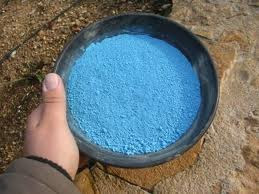
It is now the beginning of September and when I look at my roses I can see that as usual the hot summer has robbed them of their vitality, almost all of them suffer from black spot, the leaves are somewhat yellowish, in short you can see they lack something.
Emailing Michele the other day, she mentioned she had visited her father and was admiring his roses. She asked him what was his secret. He said that in spring and autumn he sprinkles "Sulphur Soil" around them bought through the following website: http://www.greenacresdirect.co.uk/organic_product_details.php?prodID=161&name=Sulphur%20Soil
She then asked me whether I had seen anything like this in France. So far I haven't but I would like to ask our members to keep a look out for a similar type of product.
I started looking for more information on Sulphur (S). It is one of the 6 major elements (macro elements) in our soil next to Nitrogen (N), Phosphate (P), Calcium (Ca), Magnesium (Mg) and Potassium (K). Quite an important element. Unfortunately for us, our alkaline soil does not contain enough Sulphur. The lack of Sulphur has an influence on the general health of the plant, plant is prone to diseases and indirectly "chlorose". Lack of Sulphur reduces the absorption of proteins hence the reduced growth.

Although it naturally occurs in our soil, we do not add Sulphur (S), we add Sulfate:

and then normally in a compound like:
Magnesium Sulfate (Epsom Salts) - the Magnesium greens things up, and the Sulfate acted upon by bacteria becomes (simplisticly) Sulphuric Acid. The average plant desires an acidic growing medium to enhance the ability of the roots to use any available nitrogen for plant growth.

Iron Sulfate - "Revised" is principally an anti-moss agent. If you live in an area with acid soil and you sprinkle Iron sulfate on your lawn it works in a similar way as Magnesium Sulfate, it encourages the growth and consequently the lawn turns a nice green colour, but only if you have acid soil, if you try the same on alkaline soil it will have no effect as the Iron sulfate becomes a "hydroxide" which is insoluble in water.
In previous meetings we have mentioned Iron sulfate as a cheap option to treat "chlorose" (a condition in which leaves produce insufficient chlorophyll) instead of the more expensive "Iron chelate". Iron chelate (chelated iron) is a soluble complex of Iron and Sodium and a chelating agent (chemical reaction involving a protein structure binding a metal element). As "chlorose" is a problem that occurs when plants that prefer acid soil are planted on an alkaline soil, there is absolutely no point in using Iron sulfate as this product cannot be broken down on alkaline soils, and therefore cannot be used to treat "chlorose". If we want to treat "chlorose" we just have to go for a product specifically aimed at treating "chlorose", there is no cheap option.

Copper Sulfate (Bouillie Bordelaise) - used extensively in France as a preventive measure against fungal and bacterial disease.

Lime Sulfate - used a lot in the U.S.A. and Canada in a similar way as Bouillie Bordelaise. It is a much more aggressive material but very successful in treating black spot on roses. The instructions on the packet have to be followed to the letter, protective gear like gloves and goggles need to be used.

Calcium sulfate (Gypsum), improves soil structure. It provides Calcium which is needed to flocculate (break up) clay in acid and alkaline soils. Gypsum decreaes pH of Sodic soils (soil high in Sodium).

All in all Sulphur, in its useable form Sulfate is very good tool for us gardeners, not only as a soil improver but also as a fungicide and pesticide.
Failing to find "Sulphur Soil" to acidify the soil, the recipe below acidifies, eliminates/reduces the chlorose and black spot problems and improves the soil structure by adding compost and manure:
Dig a trench around the rose, fill it with peat; add an anti-chlorose product; add fleurs de soufre, a highly refined powder made out of Sulphur available in hardware stores and garden centres; compost and manure. Repeat this once a year.
In addition add rose fertiliser twice a year.
Apparently when coal was being used as a fuel and the clean air act was not yet in force, roses suffered less from black spot. The following quote from Wikepedia explains why. Quote" Since coal and petroleum often contain sulfur compounds, their combustion generates sulfur dioxide unless the sulfur compounds are removed before burning the fuel. Further oxidation of SO2, usually in the presence of a catalyst such as NO2, forms H2SO4, and thus acid rain.
Bibliography: Wikipedia; UBC Botanical Garden Forums; Cursus Kruidenteelt by Dr. K. Demeyer (VUB)
No comments:
Post a Comment